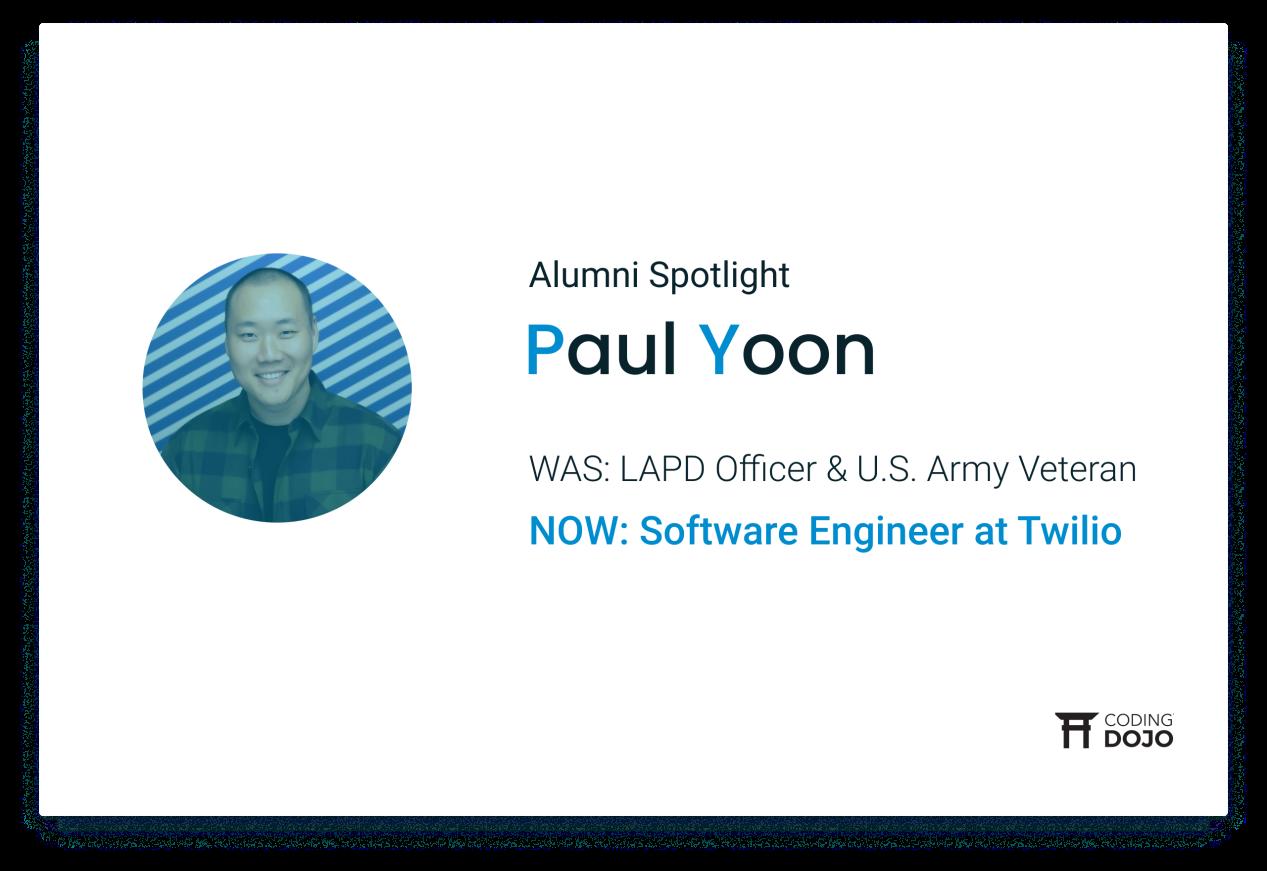
Never Settle – How I Took A Leap From the Military & Law Enforcement Into the Tech Industry
by
Tomasz David
Posted onApril 6, 2021
Editor’s Note: this article was written by San Jose graduate Paul Yoon and originally appeared in the Winter issue of U.S. Veterans Magazine.

I was in the military for four years. I served in the US Army as a wheeled-vehicle mechanic for the first two, then transitioned to an artillery surveyor. I gained experience as a radio technician, and also managed and secured transportation for equipment and personnel.
After the military, I became a law enforcement officer in Los Angeles for about five years. I had to help my parents with a lot of bills. I had to find work, and law enforcement was hiring quite heavily at the time.
I’ve always had some interest in coding. When I was an adolescent, a couple of my friends and I explored basic HTML and CSS, as well as how to build web and mobile applications. But I grew distant. A lot of my friends became software engineers, and they encouraged me to look into it once my family was more settled.
I had a stable career. I’d just bought a house. I was comfortable. But I had this mental struggle: If I stay here, accept and try to be happy with what I have, I’m settling. Do I want to live with regret, or would I rather take some time, make a few sacrifices and try it out?
Going back to school wasn’t a feasible option for me as I was helping my parents with bills. I needed something quicker and coding bootcamps were popular at the time, so I started researching. I noticed that a lot of them only covered one stack. Coding Dojo split it up into three different stacks, and that was more what I was looking for. I wanted to get my feet wet, understand certain stacks and experiment with them. At the Coding Dojo orientation, the main presenter was very open and welcoming. He was also a veteran – there’s a lot of vets in bootcamps.
Bootcamps are meant to be hard. It’s four years of coursework condensed into about four months. But I realized if I’m going to make this huge jump, I had to reserve a lot of time.
Looking at the material that we covered during the first few days, I knew that if I went home each night and just read a few things, it wasn’t going to be enough. Sometimes the material is hard to understand. I was “that guy” who asked a lot of questions, and I think that’s what helped the most. A couple of my course mates were too prideful. They wouldn’t ask the instructors, or they’d just be stuck on the same thing all day.
MERN was my favorite stack, but Python was close behind. For fun projects and applications, I would use MERN, but for deeper studies, analysis or data, I would use Python. I would’ve preferred to stay away from Java, but it’s a foundational language that is useful to know. Coincidentally enough, the work I’m in uses Java.
After graduation came the job hunt, and COVID-19 had a severe impact. I was competing for entry level jobs against people who were getting laid off as software engineers with years of experience and who were willing to take lower-paying jobs. I told myself I’d rather seek an opportunity to learn and grow than merely look for the highest-paying job. I considered a lot of paid internships, mentorships and entry-level positions. It was a lot of rejection as many apprenticeships and internships got delayed or canceled due to COVID-19.
Then, a company called Twilio finally responded about their Hatch apprenticeship. The process took two and a half months, but it ultimately worked out. I’m now officially a Software Engineering apprentice and learn something new every day.
You have to go in with the mentality that you’re going to be challenged. You have to sacrifice and compromise. Just give it everything you got. The only way to learn and understand the material is to put in the hours. Your family and loved ones will support you.
Having been in the military, making sacrifices was easy for me. I’d usually be the first one in and the last one out. I had a competitive mindset. I knew if my goals and missions were set, I couldn’t leave until I finished. It was comfortable for me to approach people from different backgrounds, being collaborative and working with peers.
The tech industry is huge. There are so many roles that start with coding and development as entry points. If you can find transferable skills similar to web development or software engineering, by all means you should consider making the change. It’s healthy. If you’re in a position where you’re not comfortable and feel like you can do more, it’s never too late. Don’t doubt that.
—
If you’re interested in learning how to code and pursuing a career that you love, Coding Dojo bootcamp offers accelerated learning programs that can transform your life. We offer both part-time and full-time online courses, as well as onsite (post COVID-19) programs. We also offer financing options, scholarships, and other tuition assistance programs to help you with financial barriers.
If you want to invest in yourself and your future, there is no better time than the present! If you’re interested, use this link to schedule a 15-minute exploratory session with one of our Admissions representatives today.
Leave a Comment